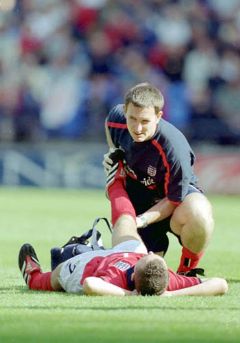Disturbances in the physiology of the musculoskeletal system, or at various levels of the peripheral & central nervous systems have all been considered (Bentley, 1996) & it may be this multi-factorial influence that has given rise to the contradictory findings in some areas of the research as different investigators have induced cramps using different methods.
The earlier investigations centred around a electrolyte depletion brought about by sweat loss, however, more recently the research seems to favour a more fatigue-induced central & peripheral nervous system model for exercise-induced cramping. The distinction is now being made between exercise-induced cramps & "exertional heat cramps", which is the term being adopted in relation to the sweat-induced symptoms potentially caused by "whole-body exchangeable sodium deficit, contracted interstitial fluid compartment & hypersensitive neuromuscular junctions" (Bergeron, 2008).
Studies by Jung et al (2005), Sulzer et al (2005) & Schwellnus et al (2004) each concluded that electrolyte loss & dehydration were not the sole causes of exercise associated muscle cramps. Meanwhile, Khan & Burne (2007) & Gabriel et al (2006) directed their research to the neural systems involved in prompting cramp & how these pathways could be influenced by exercise to promote fatigue resistance.
However, the whole point of writing this blog article today was a paper that I read last night by Miller et al (2010), which investigated the inhibition of muscle cramps by drinking pickle juice. The study used a population of hypohydrated, non-athletic college students & induced cramp following exercise before asking them to drink either a control of deionised water or pickle juice. The investigators found that the pickle juice inhibited the cramps & hypothesised that, as the effects were so fast acting, they couldn't be explained by restoration body fluids or electrolytes but instead by a neurally mediated reflex originating in the oropharyngeal region, which acted to inhibit the firing of the motor neurons in the cramping muscle.
Have a read & see what you think!!!
References

